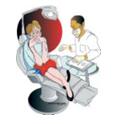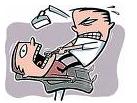Introduction
What is dental fear?
Dental fear refers to the fear of dentistry and of receiving dental care.
Who has dental fear?
Generally, women tend to report more dental fear than men and younger people tend to report being more dentally fearful than older individuals. People claim to be more fearful of more invasive procedures, such as oral surgery, than less invasive treatment, such as professional dental scalings or prophylaxis.

Is dental fear common?
It is estimated that about 75% of US adults experience some degree of dental fear, from mild to severe. Of these approximately 5 to 10 percent are considered to experience dental phobia; that is, they are so fearful of receiving dental treatment that they avoid dental care at all costs.
In Malaysia, the prevalence of dental fear is rather high. A study on a group of 407 adults indicated that the prevalence was 94.1%. Similar findings were present among teenagers and primary schoolchildren. Thus in Malaysia, dental fear seems to be a problem among most age groups
Causes
What causes dental fear?
Many people report that their dental fear began after a traumatic, difficult, or painful dental experience especially at an early age. This is why regular preventive dental care to prevent dental problems is so important. Dental fear may also develop as people hear about others’ traumatic experiences or negative views of dentistry. An example would be when peers try to scare a child by telling him the dentist is going to hurt him.
Dental fear has been associated with the following:

- Bad experiences: Dental phobia is most often caused by bad or in some cases horrific, dental experiences. This not only includes painful dental visits, but also psychological behaviours such as being humiliated by a dentist.
- A history of abuse: Dental phobia is also common in people who have been physically or emotionally abused by a person in authority.
- Uncaring dentist: It is often thought, even among dental professionals, that it is the fear of pain that keeps people from seeing a dentist. But even where pain is the person’s major concern, it is not pain per se that is necessarily the problem. Rather, it is pain inflicted by a dentist who is perceived as cold and controlling that has a huge psychological impact. Pain inflicted by a dentist who is perceived as caring is much less likely to result in psychological trauma.
- Humiliation: Other causes of dental phobia include insensitive, humiliating remarks by a dentist. In fact, insensitive remarks, negative social evaluation and the intense feelings of humiliation they provoked are among the main factors which can cause dental phobia.
- Vicarious learning: Another cause is observational learning. If a parent or caregiver is scared of dentists, children may pick up on this and learn to be scared as well, even in the absence of bad experiences. Also, hearing other people’s horror stories about visits to the dentist can have a similar effect.
- Post-Traumatic Stress: Research suggests that people who have undergone horrific dental experiences suffer from symptoms typically reported by people with post-traumatic stress disorder. This is characterized by intrusive thoughts of the bad experience and nightmares about dentists or dental situations.

Complications
What are the consequences of dental fear?
Fear of the dentist is a major stumbling block for many people. It usually prevents otherwise intelligent, rational people from optimizing and maintaining their dental health Many dentally fearful people tend to avoid dental visits and will only seek dental care when they have a dental emergency, such as a toothache or dental abscess. People who are very fearful of dental care often experience a ?cycle of avoidance,? in which they avoid dental care due to fear until they experience a dental emergency requiring invasive treatment, which can further reinforce their fear of dentistry. This avoidance of dental care can result in poor oral health as good oral health is the key to prevention – stopping problems before they arise through routine dental visits. A study conducted among a sample of 407 adults in Malaysia indicated that those with higher levels of fear were about 6 times more likely to cancel their dental appointments compared to those with lower levels of fear.
Besides the obvious effects on teeth and gums, poor oral health can affect a person’s self-confidence. Sometimes people who neglect their teeth by avoiding dentists develop psychological difficulties. This coupled together with self-consciousness of their poor oral health can really hinder a person?s social behaviour.
Management
How to overcome dental fear?
Most dental phobics have had very negative experiences with unskilled, uncaring, or incompetent dentists. Therefore, the most important step to overcoming dental anxiety is to consult a good dentist. A good dentist is one who:
- is patient
- is highly competent
- endeavours to make each meeting pain free
- genuinely cares about the patient
- has the ability to nurture a patient through past traumas

Besides this,,other techniques have been used to assist fearful patients such as the use of mild sedatives. Good face-to-face communication, answering patient’s questions and a lot of listening contributes to the relief of anxiety.
Of course, the best method is to practice good dental habits and maintain good oral health, thus minimizing dental problems which need complicated treatment.
References:
- Berggren U, Meynert G (19840. Dental Fear and Avoidance: Causes, Symptoms and Consequences. J Am Dent Assoc. 109: 247-251
- Berggren U. (1987). Reduction of Fear and Anxiety in adult fearful patients. Int. Dent. J. 37:127-136
- Corah NL, O?Shea RM, Bissel D (1985). The Dentist-Patient Relationship: Perception by patients of dentist behavior in relation to satisfaction and anxiety. J Am Dent Assoc.111:443-446
- Doer AAA,Lang WP, Nyquist LV, Ronis DL (1998) Factors associated with dental anxiety. J Am Dent Assoc. 129: 1111-1119
- Dental fear and caries status amongst 16-year old schoolchildren MCD thesis 2002
- Dental fear and caries experience amongst antenatal mothers. MPH thesis 2006
| Last reviewed | : | 23 Ogos 2019 |
| Writer | : | Dr. Savithri a/p Vengadasalam |
| Reviewer | : | Dr. Sharol Lail bin Sujak |







